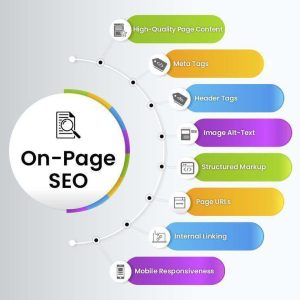on-page SEO helps search engines understand your website and the content connected to it.
In the digital age, ensuring that your website is easily discoverable by search engines has become crucial for online success. One of the most effective strategies to achieve this is through On-Page SEO. In this article, we will delve into the world of On-Page search engine optimization, discussing its importance and providing actionable tips for optimizing your website’s content. So, let’s get started and unlock the potential of your website!
Section : Understanding On-Page SEO
– Definition of On-Page SEO and its significance
– How search engines evaluate and rank web pages
– The role of On-Page SEO in improving search engine visibility
What is On-Page search engine optimization?
On-page search engine optimization (also known as “on-site search engine optimization”) is the practice of optimizing web page content for search engines and users. Common on-page search engine optimization practices include optimizing title tags, content, internal links and URLS.
Why Is On-Page search engine optimization Important?
On-page SEO is important because it helps search engines understand the content and relevance of your website pages. on-page search engine optimization improves your website’s visibility in search engine results. It also enhances the user experience by making your website more user-friendly and easily navigable. Ultimately, on-page search engine optimization plays a crucial role in driving organic traffic to your website and improving its overall ranking, leading to increased visibility and potential for conversions
Search engines use keywords and other on-page SEO elements to check whether a page matches a user’s search intent. Every part of on-page search engine optimization is completely up to you; that’s why it’s critical that you do it correctly. Now, let’s discuss the elements of on-page search engine optimization.
On-Page search engine optimization Checklist
- Make sure your keyword is in your URL.
- Optimize your page title.
- Use headers.
- Include keywords in your body copy.
- Incorporate images, graphics, and other visuals.
on-page search engine optimization is an ongoing process, so it’s important to continuously monitor and refine your optimization efforts to improve your search engine rankings and user experience.
also known as on-site search engine optimization, refers to the optimization techniques implemented directly on a website to improve its search engine rankings and visibility. Some of the benefits of implementing on-page search engine optimization include:
On-page search engine optimization involves optimizing your site’s structure, navigation, and overall user experience. On-page search engine optimization techniques also include optimizing your website for mobile devices. On-page search engine optimization involves optimizing page load times, image sizes, and eliminating unnecessary code. on-page SEO is important, it should be complemented with other search engine optimization strategies like off-page SEO and technical SEO for maximum effectiveness.
Elements of Highly Effective On-Page search engine optimization:
Keywords
Keywords are vital components of an effective on-page search engine optimization strategy. They refer to the search item(s) an Internet Proper Headlines
To achieve a highly effective on-page search engine optimization, create strong headlines by using H1 headline for your page title. Utilizing this headline sends out a strong signal of relevance for searches.
user inputs on a search engine site.to achieve a highly effective on-page search engine optimization strategy, make sure to participate in Social Media.to achieve a highly effective on-page SEO strategy, make sure to participate in Social Media. google pays attention to on-page search engine optimization signals when ranking pages.
Advantage of On-Page search engine optimization: The main advantage of on-page search engine optimization is that it allows you to optimize your website’s content and structure in order to improve its visibility and ranking on search engine result pages (SERPs). By implementing on-page SEO practices. Some specific advantages of on-page search engine optimization include:
- Improved rankings: Effective on-page search engine optimization techniques, such as optimizing title tags, meta descriptions, and headers, help search engines understand the relevance and context of your web pages.
- Enhanced user experience: On-page search engine optimization involves improving the overall user experience of your website. By optimizing page load speed. Better targeting of relevant keywords: SEO allows you to target specific keywords that are relevant to your business or industry. Long-term benefits: Unlike paid advertising, which requires ongoing investment, SEO efforts can have long-lasting benefits. So, SEO is important because many of the signals Google uses to rank web pages come from on-page elements.

